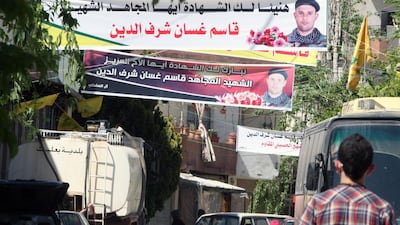BEIRUT // For the first time in a long while, the streets of Lebanon’s capital look a little different.
There is still the choked traffic crossing the city to the frustrated chorus of horns, the Syrian refugees begging for change on the sidewalks, and buildings peppered with bullet holes. But gone — for now at least — are the stern faces of young men killed in battle peering down from walls, the former warlords keeping watch from lampposts, and the tattered banners pledging loyalties fluttering overhead.
In a bid to dampen sectarian tensions in Lebanon, a government campaign to remove political flags, banners and posters from the streets of Beirut and other Lebanese cities began on February 5. The order to remove the reminders of the country’s past and current conflicts came from a deal struck in reconciliation negotiations between two of Lebanon’s political powerhouses, Hizbollah and the Future Movement.
Political posters have been a part of Lebanon’s streets for decades now, a hangover from the country’s 1975-1990 civil war. There are the portraits of slain political leaders — like Shiite leader Musa Sadr who disappeared in Libya in 1978 and former Lebanese prime minister Rafik Hariri, who was blown up by Beirut’s seaside ten years ago. Slain fighters get their spots as well: Hizbollah men killed fighting in Syria hang on the walls of southern Beirut and pictures of Sunni militiamen are a common sight in the northern city of Tripoli.
The ubiquitous posters and flags denote control and influence over areas in a nation where political parties and their militias still hold the most sway on the street. And in a city without reliable street addresses, the political signs can sometimes serve a more practical purpose as useful landmarks by which to navigate.
While the signs have now been taken down in many areas of Beirut, there is doubt that their removal will actually reduce the long-standing sectarian tensions here — tensions that have only worsened with the war in Syria.
“We remove the signs of conflict, but the conflict or dynamic of conflict is still there,” said Lokman Slim, a secular publisher and activist who heads an organisation that documents Lebanon’s conflicts. “They are brewing, they are climbing and at any moment they can come back, be it through posters or be it through more violent means.”
If history is taken into consideration, the chances that the campaign will be successful are low.
Authorities ordered political signs to be taken down in 2008, just months after Hizbollah and its allies seized West Beirut by force in an incident that nearly sent Lebanon tumbling into civil war. The posters disappeared for a while, but they quickly reappeared.
There are also unintended consequences of removing adornments from the streets.
At a major intersection near Beirut’s ritzy downtown district, a large graffiti mural portraying the words “to be free, or not to be?” was painted over by authorities on the first day of the campaign. The mural had been installed there in 2012 by March Lebanon, a secular anticensorship group. The group’s founder Lea Baroudi said they had received permission for the artwork from both the governor of Beirut at the time and the building’s owner. She feels that art should not be targeted in a campaign aimed at reducing tensions between Lebanon’s powerful, sectarian political parties.
“You will keep seeing pictures of political leaders and slogans while they’re removing the graffiti and the art,” she said. “I’m not saying that solving the Sunni-Shite conflict or whatever is not important, but let’s not lose sight of things that we should preserve to preserve a society that is diverse, open-minded and has other things to think about.”
Last week, Beirut’s governor Ziad Chebib told the group they would be allowed to repaint the mural.
So far, the campaign seems to be focused on Beirut’s main thoroughfares and areas that have a mixed sectarian make-up.
Near one of those fault lines, empty spots where posters of political leaders had once hung could be seen. But also on the walls were new, crisp posters depicting Hizbollah fighters killed in Syria.
In areas where the population is more homogeneous, there has been little attempt to get rid of political signs.
In Beirut’s southern suburbs, an area controlled by Hizbollah where the state has little reach, the yellow banners of party remain undisturbed.
“They will bring them down and we will put them back up,” said Bilal, a Hizbollah supporter in his 20s.
Nearby, another resident agreed.
“This is a joke, it’s just to keep people busy and keep their minds off things,” said Mohammed, a middle-aged Hizbollah fighter. “As long as the crisis goes on in Syria, there will be tensions in the streets.”
foreign.desk@thenational.ae

